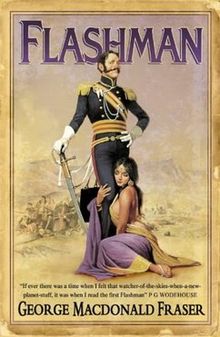 Stockbrokers cheered as they watched Wolf of Wall Street. Thousands of girls tried to redeem Draco Malfoy through fanfiction. It’s actually pretty hard to create a bad guy that people actually dislike.
Stockbrokers cheered as they watched Wolf of Wall Street. Thousands of girls tried to redeem Draco Malfoy through fanfiction. It’s actually pretty hard to create a bad guy that people actually dislike.
Flashman take a bully from Thomas Hughes’ Tom Brown’s School Days and describes his later adventures in the British Raj (and beyond). He rides horses, plays cricket, embarrasses himself in battle, and has carnal knowledge of many famous historical women.
He’s incredibly cowardly, but his attempts to desert, abandon, and betray his own side are always misunderstood as acts of heroism, and he emerges from each book with a lapel weighed down by still more (spectacularly unearned) medals and decorations.
Fraser seems to be taking shots at Victorian-era vainglory. Or maybe he’s not even being cynical: Flashman legitimately inspires people, even though his heroics are a sham. If someone as fundamentally worthless as Flashman can achieve glory, what’s your excuse?
The books are hilarious and action-packed. What’s often ignored is how well researched they are. Fraser was himself a soldier, a journalist, and a historian, and the Flashman Papers are packed full of footnotes illuminating the time period, all written as if Flashman was a real historical figure. (“Flashman, like many other European writers, uses the word “Ghazi” as though it referred to a tribe, although he certainly knew better. In Arabic “ghazi” is literally a conqueror, but may be accurately translated as hero or champion…”)
The books contain walk-on appearances from legendary figures, both real and fictional (ie, Sherlock Holmes). Frasier takes glee in depicting beloved cultural icons as nasty, malevolent people, as bad as Flashman himself. It’s like the monster movie cliche where you have to show Godzilla smashing Big Ben or the Eiffel Tower.
I hit the eject button on this series after about four or five books. They were blurring together, and Flashman’s sheer number of improbable escapes (along with his supernatural ability to learn every new language he encounters) was stretching believability. But (like many women) I had a good time with Flashman, at least while he lasted.
Fantasy writer David Gemmell learned early on to never discover the truth about his heroes. As a boy, he read a history book about the Alamo, and was amazed that he’d ever admired Jim Bowie and Davy Crockett. He took refuge in the books of Tolkien and Moorcock, where heroes’ names are written in permanent ink. Nobody can ever make Gandalf less than Gandalf. But some of us prefer heroes with feet of clay – or in Harry Paget Flashman’s case, an entire body made of the stuff.
No Comments »
Comments are moderated and may take up to 24 hours to appear.
No comments yet.
